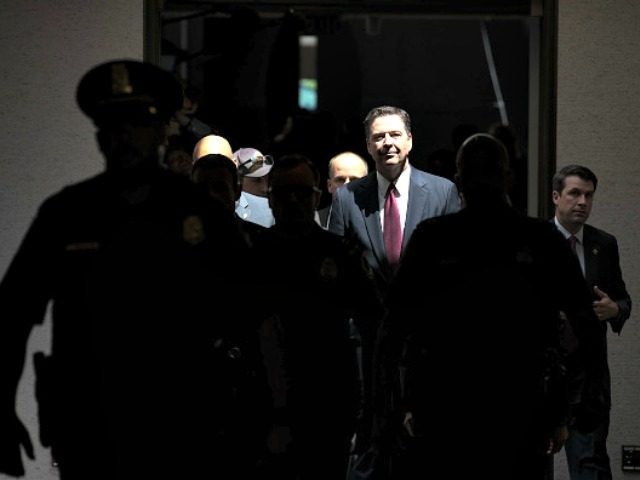In testimony before the Senate Intelligence Committee, fired F.B.I. Director James Comey admitted that he was one of the Washington leakers that have wreaked havoc in the capital. But it is clear he did not leak all he knew — only what he thought would hurt President Donald Trump.
During his testimony, Comey admitted to attempting to influence Congress to appoint a special counsel to investigate accusations that President Trump colluded with Russian agents to affect the 2016 election. Comey said that he secretly sent his “memos” to “a friend” to leak to the press to force Congress to appoint a special counsel for the investigation.
The memos were accounts of meetings with Trump that otherwise would have no such record. Comey then leaked them to his “friend” — after he was fired as F.B.I. chief.
“I asked a friend of mine to share the content of the memo with a reporter,” Comey said during his testimony on Thursday. “I didn’t do it myself for a variety of reasons, but I asked him to because I thought that might prompt the appointment of a special counsel.”
Comey’s admission means we can put his name on any list of those leaking inside government information to the press in a capital already leaking like a sieve.
Of note, the information Comey leaked only pertained to and could harm the President. This is something that didn’t escape the attention of Trump’s attorney, Marc Kasowitz.
In a statement made only hours after Comey finished his testimony, Kasowitz called the leaks “retaliatory”:
…it is overwhelmingly clear that there have been and continue to be those in government who are actively attempting to undermine this administration with selective and illegal leaks of classified information and privileged communications. Mr. Comey has now admitted that he is one of these leakers.
Today, Mr. Comey admitted that he unilaterally and surreptitiously made unauthorized disclosures to the press of privileged communications with the President. The leaks of this privileged information began no later than March 2017 when friends of Mr. Comey have stated that he disclosed to them the conversations that he had with the President during their January 27, 2017 dinner and February 14, 2017, White House meeting. Today, Mr. Comey admitted that he leaked to friends of his, purported memos of those privileged conversations, one of which he testified, was classified. Mr. Comey also testified that immediately after he was terminated he authorized his friends to leak the contents of those memos to the press in order to, in Mr. Comey’s words, “prompt the appointment of a special counsel.” Although Mr. Comey testified that he only leaked the memos in response to a tweet, the public record reveals that the New York Times was quoting from those memos the day before the referenced tweet, which belies Mr. Comey’s excuse for this unauthorized disclosure of privileged information and appears to be entirely retaliatory. We will leave it to the appropriate authorities to determine whether these leaks should be investigated along with all the others that are being investigated.
But the former Bureau boss also revealed his sour opinion of several other people in government, including Obama Attorney General Loretta Lynch. Yet none of this information was surreptitiously leaked to the press before his Thursday appearance.
For instance, Comey told the Committee that Lynch attempted to get him to alter his investigation of Hillary Clinton’s violations of national security with her private email server, an act that seems the very definition of “obstruction.”
“During questioning, Comey said that while the Hillary Clinton email case was ongoing, Lynch asked him to refer to the probe as a ‘matter’ rather than an ‘investigation,'” the Washington Post reported on Thursday.
Comey said he thought that Lynch’s instructions “gave the impression that the attorney general was looking to align the way we talked about our work with the way the campaign” talked about it. “That was inaccurate. That gave me a queasy feeling,” he added.
Presumably, Lynch’s attempt to get Comey to soften and spin his investigation into Hillary came from President Obama, her boss.
Another tidbit Comey did not secretly leak was that he told President Trump that he wasn’t under investigation.
Trump was attacked by news outlets like CNN and The New York Times because “unnamed sources” told them that Comey did not say Trump was not under investigation.
In the President’s letter informing Comey that he was fired, there was a section thanking Comey for telling him “on three separate occasions” that there was no F.B.I. investigation.
In his May 9 letter firing Comey, Trump said, “While I greatly appreciate you informing me, on three separate occasions, that I am not under investigation…” It was this that CNN and the Times claimed was a lie.
As evinced by his testimony, it is clear Comey already knew that Trump was telling the truth about being told he wasn’t under investigation. But the F.B.I. Chief didn’t leak that either, allowing the media to spend weeks attacking Trump as a liar on the matter.
In his testimony, Comey seemed to verge on tears when recounting how hurt he was that Trump said the F.B.I. was in disarray due to Comey’s leadership. “Those were lies, plain and simple,” Comey said.
But Comey’s denial rings hollow when contrasted with the many reports late last year, and since, that few of his underlings at the Bureau agreed with his pronouncements of Hillary Clinton’s innocence. Even as late as last month, new Acting FBI Director Andrew McCabe acknowledged that Comey’s decision to exonerate Hillary was met with anger by many F.B.I. agents. Comey’s decision was said to have hurt the Bureau’s morale.
Follow Warner Todd Huston on Twitter @warnerthuston or email the author at igcolonel@hotmail.com.

COMMENTS
Please let us know if you're having issues with commenting.